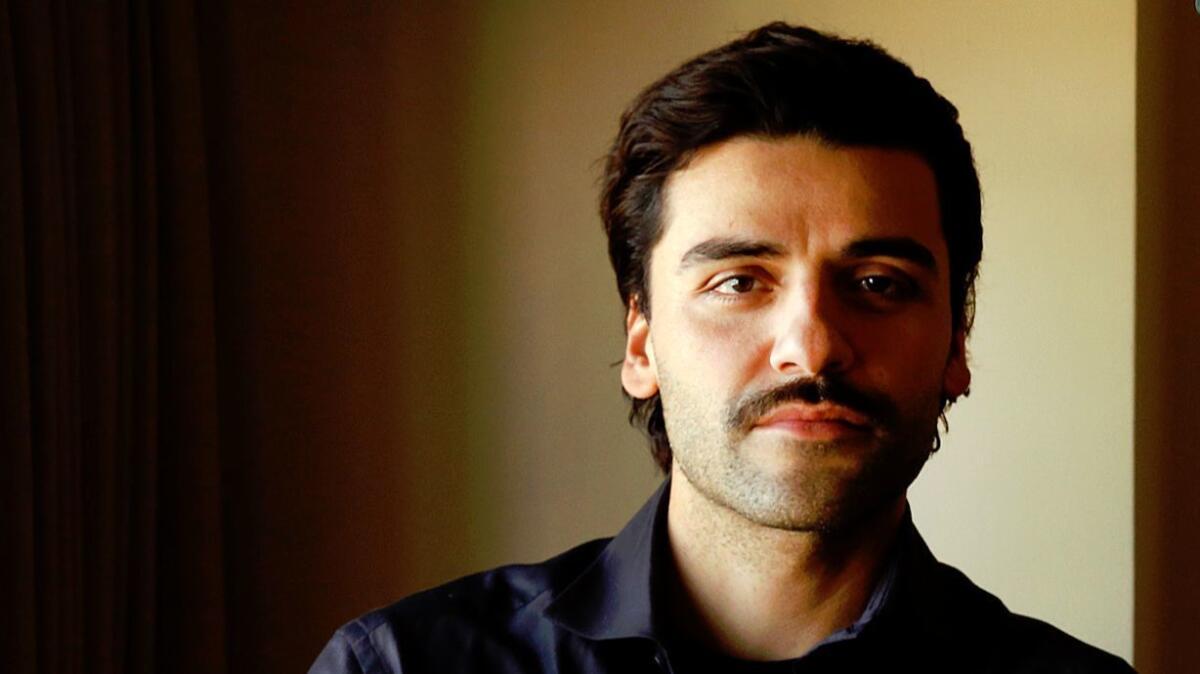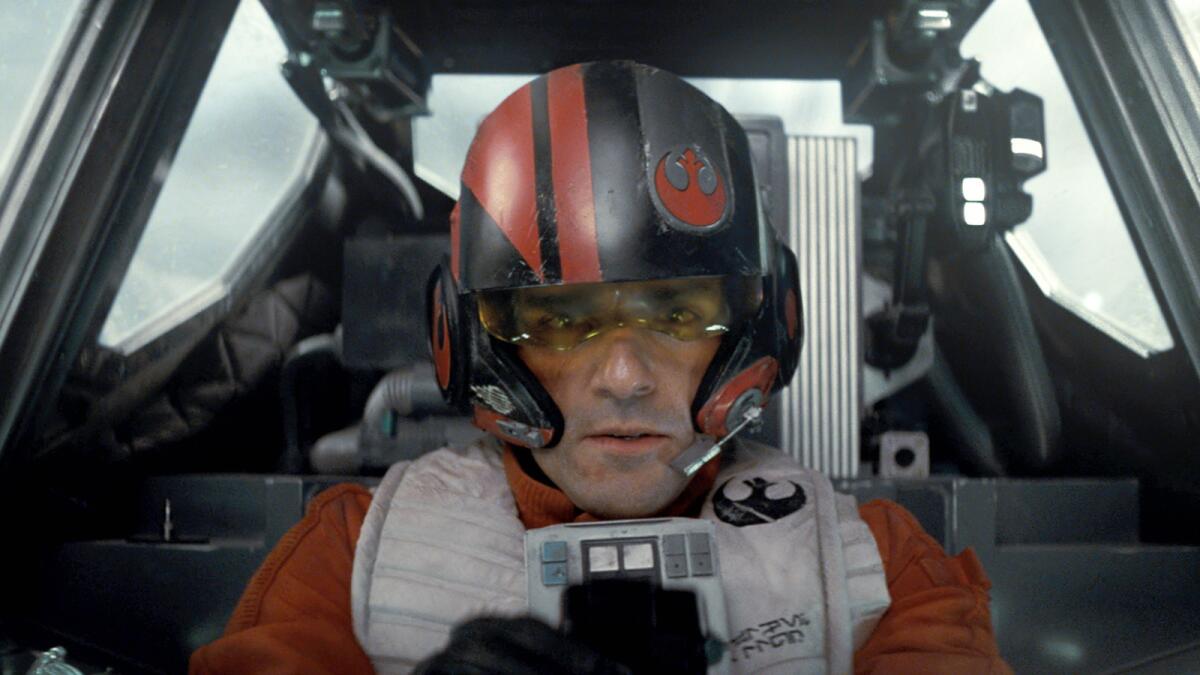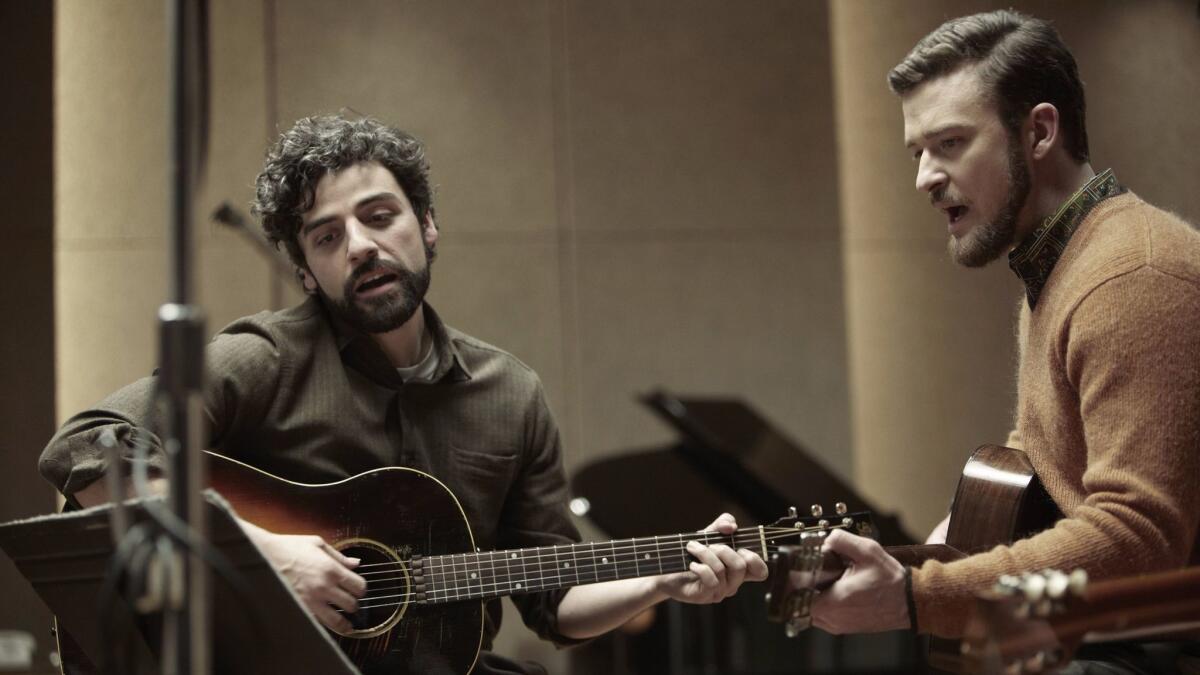Oscar Isaac reflects on his key roles as Poe Dameron, Llewyn Davis and, of course, Fartman

- Share via
“I always knew I could be an actor, even when nobody else did,” Oscar Isaac says.
In the last few years, the 38-year-old has proved he was correct. Isaac, born in Guatemala and raised in Miami, got his start in film right out of school, but it’s been his more recent work, like “Inside Llewyn Davis” and “Ex Machina,” that put him on the map. The recurring role he landed in the rebooted “Star Wars” franchise as rebel pilot Poe Dameron made him an superstar.
His latest project, “The Promise,” which opened earlier this month, tackles the Armenian genocide, in which historians estimate that 1.5 million Armenians and other ethnic and religious minorities perished at the hands of the Ottoman Turks beginning in 1915, although the Turkish government denies there was any official policy of ethnic cleansing. Isaac plays an Armenian medical student caught in the middle of the horrific drama as World War I breaks out in his country. It’s one of several films the actor has coming out this year, which also include the George Clooney-directed “Suburbicon” and “Star Wars: The Last Jedi.”
The IMDB Files: Hollywood star reflect on their key roles »
“It’s exciting, but it’s also nerve-wracking, because often, I don’t know what the next script is going to be or which way they’re going,” Isaac says of his “Star Wars” experience. “What’s been wonderful with [director] Rian [Johnson] is that I got to sit down with him beforehand and we talked a little bit and I told him what I was interested in and he gave me a sense of what he was looking at doing. You’d think with so much at stake, it would be really rigid, but it hasn’t been.”
Isaac, whose next project is a stage production of “Hamlet” at New York’s Public Theater, is open to all sorts of roles, but he feels they should have one thing in common: “What I’ve always looked for is the comic in the dramatic and the dramatic in the comic and where those things meet and the brackish waters in between. When I came across Chekhov for the first time, I just loved it, because it was always going in between both. That balance is always something that’s intriguing to me. Generally, I try to look for that.”
Here, Isaac unpacks some of his most memorable roles.
“The Promise,” Mikael Boghosian (2017)
“I, to my great shame, didn’t know very much at all about the Armenian genocide before. When I read the script with the scenes of horror and the atrocities in it, it definitely felt like something I wanted to be a part of. To be part of something like that and be part of something where 100% of the proceeds go to charities that deal with human rights issues makes it more than just a movie.”
“X-Men: Apocalypse,” En Sabah Nur/Apocalypse (2016)
“What I remember about that most was just trying to survive in that getup. My entire head was encased in prosthetics, and there was a 40-pound suit that had a cooling mechanism underneath. I was basically in high-heeled shoes. I had to be in my own separate tent and sit in this weird saddle because I couldn’t sit on a normal chair. I feel like I got really good at breathing and meditation during that shoot.”
“Star Wars: The Force Awakens,” Poe Dameron (2015)
“I was told that

“Ex Machina,” Nathan (2014)
“That was one of my most treasured experiences. [Director] Alex Garland and I became really good friends, and I really enjoy the way he works. It feels like when he and I work on something together we’re like mechanics — we find the right tool and try to fix the problem together. It’s a really rewarding feeling. I really nerded out on all of the consciousness of artificial intelligence stuff that was out there. We would have countless hours where we would be talking about the themes. And then the language. That’s not something you get a lot in film, and he had written this very intricate dialogue between these three characters. That was a lot of fun.”
“A Most Violent Year,” Abel Morales (2014)
“What was cool about that is I was able to walk to work because we shot in Greenpoint [Brooklyn, where he lives]. But it was a tricky one. He’s such an opaque character. It was a bit of an enigma how to get under that character’s skin and figure out how to express what he was feeling, but because of the nature of who he is never allow the stuff to really bubble to the surface — at least not in an overt way.”
“Inside Llewyn Davis,” Llewyn Davis (2013)
“It felt like I was being born. To not only get the chance for the first time to play a leading role, but for it to incorporate my other love, which is music and guitar and singing, and to have [the Coen brothers] guide me was amazing. It was like an education. It was so meaningful to me. And then all these doors opened up and I was asked to do things. I am eternally grateful I was able to be part of that movie.”

“Drive,” Standard (2011)
“I had told Nicolas Winding Refn that I didn’t want to do the film, because I didn’t like the character, and I felt like he was a bit of a cliché and a bit of a stereotype. He was written as a Latino thug who didn’t care about his family and who was in and out of prison. I wasn’t interested in playing that. Nick said, ‘If you could play him as anything you wanted, what would it be?’ So we started developing the character and he became a different man.”
“Lenny the Wonder Dog,” Fartman (2005)
“Yeah, I was Detective Fartman. That was in Miami. I was just out of high school. I played one of two bumbling officers. No farts ever happened, though, so I’m not sure where the name Fartman actually comes from.”
Only good movies
Get the Indie Focus newsletter, Mark Olsen's weekly guide to the world of cinema.
You may occasionally receive promotional content from the Los Angeles Times.







